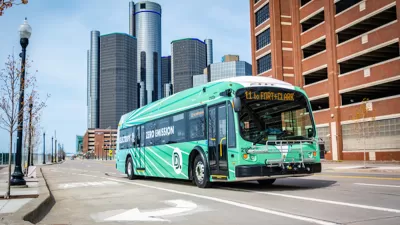Released earlier this week by the Institute for Economics and Peace, the annual United States Peace Index (USPI) analyzes peacefulness at the state and city levels, and the costs associated with violence. Richard Florida discusses its findings.
Measuring peacefulness according to five indicators: the number of homicides, number of violent crimes, the incarceration rate, number of police employees and the availability of small arms, the USPI indicates that, "the United States is significantly less violent and more peaceful than it used to be." However, "the U.S. remains significantly less peaceful than other advanced nations," and as Florida notes, "It is one of only two OECD nations that are not among the top 50 most peaceful nations in the world."
At the state level, the report indicates that, "New England ranks as the nation's most peaceful region with the lowest scores," with Maine declared "the most peaceful state for the 11th consecutive year." On the other end of the spectrum, "Louisiana is the least peaceful state on the State Peace Index, followed by Tennessee, Nevada, Florida, and Arizona."
This year is the first time that the study ranked the peacefulness of the 61 most populous metropolitan areas in the country, with Cambridge, MA coming out on top and Detroit on the bottom.
Florida finds correlations between violence and a number of socio-economic factors including education, religiosity, political orientation, and teen pregnancy rates.
According to Florida, "Two factors that stand out are poverty and inequality. Higher levels of violence and lower levels of peace are closely associated with both, at the state and metro levels. The report finds one of the very highest correlations between lack of peace and the percentage of children living in single parent households."
FULL STORY: The Most (and Least) Peaceful Places in America

Alabama: Trump Terminates Settlements for Black Communities Harmed By Raw Sewage
Trump deemed the landmark civil rights agreement “illegal DEI and environmental justice policy.”

Planetizen Federal Action Tracker
A weekly monitor of how Trump’s orders and actions are impacting planners and planning in America.

The 120 Year Old Tiny Home Villages That Sheltered San Francisco’s Earthquake Refugees
More than a century ago, San Francisco mobilized to house thousands of residents displaced by the 1906 earthquake. Could their strategy offer a model for the present?

Ken Jennings Launches Transit Web Series
The Jeopardy champ wants you to ride public transit.

BLM To Rescind Public Lands Rule
The change will downgrade conservation, once again putting federal land at risk for mining and other extractive uses.

Indy Neighborhood Group Builds Temporary Multi-Use Path
Community members, aided in part by funding from the city, repurposed a vehicle lane to create a protected bike and pedestrian path for the summer season.
Urban Design for Planners 1: Software Tools
This six-course series explores essential urban design concepts using open source software and equips planners with the tools they need to participate fully in the urban design process.
Planning for Universal Design
Learn the tools for implementing Universal Design in planning regulations.
Clanton & Associates, Inc.
Jessamine County Fiscal Court
Institute for Housing and Urban Development Studies (IHS)
City of Grandview
Harvard GSD Executive Education
Toledo-Lucas County Plan Commissions
Salt Lake City
NYU Wagner Graduate School of Public Service





























